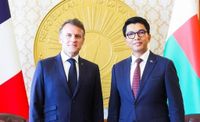French President Emmanuel Macron embarked on a historic trip to Madagascar on April 24, 2025, marking the first official visit by a French president to the Indian Ocean nation in two decades. This visit aims to strengthen bilateral relations between France and Madagascar, with a focus on enhancing economic cooperation.
During his two-day visit, Macron announced plans to sign significant agreements covering energy, infrastructure, digital technology, and tourism. Among the key projects discussed is a major hydroelectric dam in Volobe, located on Madagascar's eastern coast, which is set to receive funding from the French Development Agency (AFD) along with a loan from the French treasury.
Amidst rising geopolitical tensions in the region, including ongoing territorial disputes, Macron's visit emphasizes the importance of reinforcing France's presence in Madagascar. However, the backdrop of colonial history complicates these diplomatic efforts. Macron openly addressed the sensitive topic of colonial legacy during his visit, expressing a desire to seek "forgiveness" for France's past actions in Madagascar.
On April 24, Macron stated, "I want to seek forgiveness for France's colonisation of Madagascar, starting with the return of looted cultural artefacts." This statement highlights a significant shift in France's approach to its former colonies, as it acknowledges the historical grievances stemming from colonial rule.
Macron's visit also brought renewed attention to the long-standing dispute over the Îles Éparses, a group of scattered islands that are claimed by both France and Madagascar. The sovereignty of these islands has been a contentious issue, and Macron's discussions during the visit included attempts to address these claims.
While the agreements on energy and infrastructure are crucial for Madagascar’s development, the colonial legacy remains a sensitive topic that cannot be overlooked. Macron’s acknowledgment of the need for forgiveness signals an attempt to mend relations and foster a more equitable partnership between the two nations.
As Madagascar continues to develop its economy, the French government aims to play a pivotal role through investments and cooperation in various sectors. The hydroelectric project in Volobe is expected to not only provide energy but also create jobs and stimulate local economies.
In addition to economic discussions, cultural exchanges were also a focal point of Macron’s visit. The return of cultural artefacts looted during the colonial era is seen as a step towards reconciling past injustices and fostering goodwill between the two countries.
Macron's visit to Madagascar is not just a diplomatic gesture; it represents a crucial moment in the relationship between France and its former colonies. By addressing colonial issues head-on, Macron is attempting to reshape the narrative and build a future based on mutual respect and cooperation.
As Madagascar navigates its path towards economic growth, the support from France, alongside the acknowledgment of historical grievances, could pave the way for a more prosperous and collaborative future. The agreements signed during this visit are expected to lay the groundwork for deeper ties that could benefit both nations.
In conclusion, Macron's trip to Madagascar signifies a pivotal moment in Franco-Malagasy relations. By addressing the colonial past while focusing on future cooperation, Macron is attempting to create a balanced partnership that acknowledges history while looking forward to mutual development.




